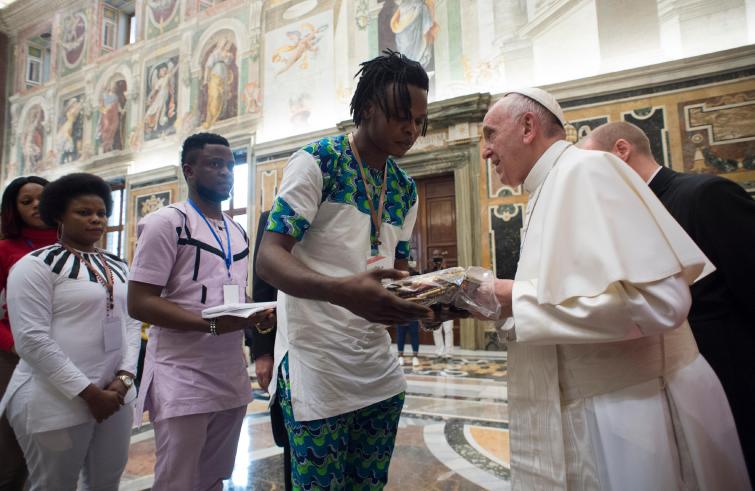
Ahead of the World Day against Trafficking in Persons – celebrated today, July 30th – Pope Francis called for a “renewed commitment”, aimed at the “total eradication of this scourge”, in a letter addressed to the members of the No a la Trata (No to Trafficking), Episcopal Commission for Justice and Peace (CNJYP) of the Argentinean Church. Since the beginning of his pontificate, coinciding with the establishment of the relevant UN Day in 2013, Bergoglio condemned trafficking in persons as “an ignominious and shameful practice for our societies that proclaim themselves civilized”, describing it as “the most extensive form of slavery in this twenty-first century.” The Pope’s commitment to raise the awareness of the international community on the subject is reflected in so many of his speeches that it has become a recurring theme of his magisterium. The goal is to eradicate once and for all this
“crime against humanity”, which “concerns every country, even the most developed. It is a reality which affects the most vulnerable in society: women of all ages, children, the handicapped, the poorest, and those who come from broken families and from difficult situations in society.”
In addition to the pleas expressed in speeches, homilies and documents, Francis promoted a set of initiatives, such as the creation of the Santa Marta Group in 2014 – a global alliance of police chiefs, bishops and religious communities – and the creation of the World Day of Prayer and Reflection, celebrated on 8 February each year, in memory of Saint Josephine Bakhita, the nun from Sudan who as a child suffered the tragic experience of being enslaved, sold and bought. Not to mention the concrete gestures of closeness, such as the visit on August 12, 2016 to Rome’s “Pope John XXIII Community” founded by Don Oreste Benzi, where the Pope met 20 women freed from prostitution racket. Showing closeness “to children and women who are victims of prostitution and human trafficking, humiliated in their essential human dignity” was likewise the focus of his Apostolic journey to Thailand – his last international journey to date – in 2019, which included a visit to Japan. In his address at Chulalongkorn University (Bangkok), the most ancient in the Country, where he met the leaders of Christian denominations and other religions, Francis denounced “the many present-day forms of slavery, especially the scourge of human trafficking.” Furthermore, Talithà Kum – the International Network of Consecrated Life Against Trafficking in Persons – has been operational since 2009 in 70 Countries, and the Migrant and Refugees section of the Dicastery for Promoting Integral Human Development published Pastoral Orientations on Human Trafficking. Meanwhile, figures on trafficking worldwide are worsening dramatically, with more than 108,000 cases in 164 countries in 2019. According to the International Labour Organization (ILO), over 40 million are victims of trafficking and exploitation, although in many cases this crime continues being unreported. Of the reported cases, 23% involved minors and 1 case out of 20 involved children under 8 years of age. Asia and Africa remain the most affected regions. The crisis caused by the Covid-19 has undeniably worsened an already serious situation, as was recently denounced by Caritas Internationalis.
A wound that must be healed. “Healing this wound – because it is a real wound! – that exploits the weakest, takes the commitment of all: institutions, associations and educational agencies”, the Pope said after the Angelus prayer of February 9: “On the prevention front, I would like to point out that various studies show that criminal organisations increasingly use modern means of communication to lure victims under false pretences. It is therefore necessary, on the one hand, to educate people in the healthy use of technology and, on the other hand, to monitor and remind service providers of their responsibilities.”
Crime against humanity. “Trafficking disfigures the humanity of the victim, offending the person’s freedom and dignity. At the same time, it dehumanizes those who carry it out”, Francis said on April 11 2019. “For this reason , it is to be considered a crime against humanity. Of this, there can be no doubt. The same gravity, by analogy, must be attributed to all forms of contempt for the freedom and dignity of every human being, whether a compatriot or a foreigner.”
Preventing, protecting, prosecuting. “I feel I should express special thanks to the many religious congregations that have worked and continue to work, also through networking, as the “front line” of the Church’s missionary action against all forms of trafficking”, is Francis’ homage, in the same speech, to those working on the front lines to defend the victims of trafficking: “The offices established by local Churches, religious congregations and Catholic organizations, are called to share their experience and knowledge, join forces and coordinate their activity regarding the countries of origin, transit and destination of those who are trafficked. To make its action more adequate and effective, the Church should welcome the help of other political and social actors. Engagement in structured collaborations with public institutions and civil society organizations will guarantee more effective and longer-lasting results.”










